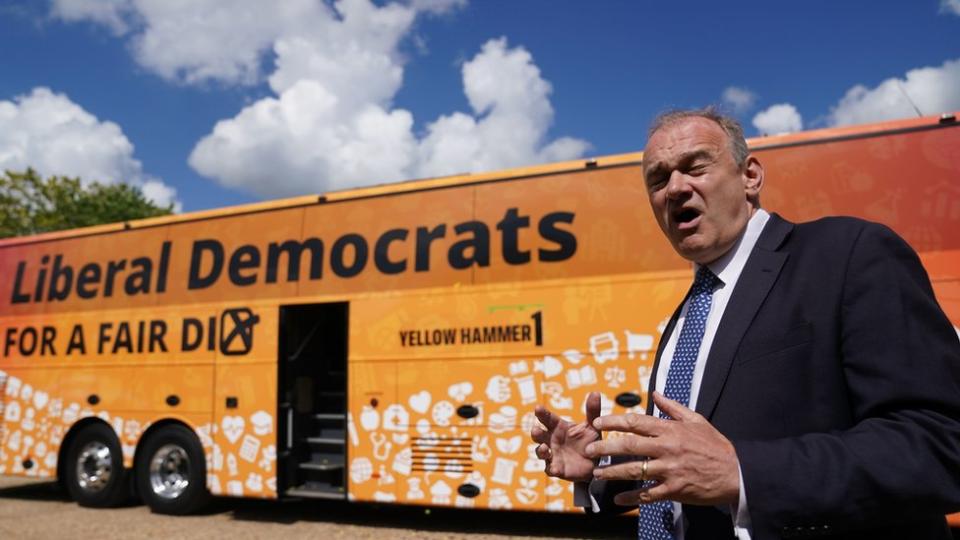Labour's Rachel Reeves rules out increasing income tax or NI
Labour has said there will be no rises in income tax or National Insurance if it wins the general election - but some spending cuts have not been ruled out.
Shadow chancellor Rachel Reeves told the BBC's Laura Kuenssberg she did not want to make any spending cuts.
But she was "under no illusion about the scale of the challenge" and would face "difficult decisions", she said.
The Conservatives have cut National Insurance twice and said they aim to scrap it when circumstances allow.
Economic Secretary to the Treasury Bim Afolami said Ms Reeves' comments showed this was "just the same old Labour Party who have no plan to cut taxes and instead are leaving hard-working families to foot the bill for their unfunded spending commitments".
The choice at the election was between "a clear and bold plan to cut taxes, and end the double tax on work, under Rishi Sunak, or going back to square one with the same old Labour Party, who as soon as they run out of money will come after yours", he added.
Ms Reeves told Sunday with Laura Kuenssberg Labour supported lower taxes, but she would not put forward "unfunded proposals".
Pressed repeatedly on her tax plans, she said: "What I want and Keir [Starmer] wants is taxes on working people to be lower and we certainly won't be increasing income tax or national insurance if we win at the election.
"We opposed the increases to national insurance when Rishi Sunak put those forward as chancellor.
"Unlike the Conservatives, who have already racked up £64bn of unfunded tax cuts in just three days of this campaign, I will never play fast and loose with the public finances, I will never put forward unfunded proposals."
Labour has claimed the government's ambition to abolish national insurance contributions for workers would cost £46bn, but the Conservatives have said this will not happen before 2030 and only if the economy grows sufficiently,
The Tories claim Labour's spending commitments would leave a £38.5bn black hole in government finances, equivalent, Mr Afolami said, to a "tax rise of £2,094 on every hardworking family". Labour has dismissed the figures.
On Saturday, independent think tank The Institute of Fiscal Studies issued a stark warning about the challenges awaiting the next government, saying the state of public finances hung over the election campaign "like a dark cloud".
It warned that more tax rises or cuts to public services could lie ahead, whoever won on 4 July.
Ms Reeves promised there was "not going to be a return to austerity", saying commitments to boost frontline services were a "down payment on the changes that we want to make".
"That money for our NHS, the additional police - 13,000 additional police and community officers - and the 6,500 additional teachers in our schools, they are all fully costed and fully funded promises because unless things are fully costed and fully funded, frankly, you can't believe they're going to happen."
She said Labour would raise some of the money by ending the VAT exemption for private schools and by extending the windfall tax on energy firms.
The party has also said it will raise £5bn a year by tackling tax avoidance and evasion, and £2.6bn by closing "loopholes" in the government's plans to abolish non-dom exemptions. Non-doms are UK residents whose permanent home for tax purposes is abroad, meaning they do not have to pay UK tax on money they earn overseas.
Spending review
"But in the end we have to grow the economy, we have to turn around this dire economic performance," Ms Reeves added.
Later, during a campaign visit to Ossett, West Yorkshire, when asked if she would rule out rises in other taxes including VAT and capital gains tax, she said: "There is nothing in our plans that requires further tax rises."
While the shadow chancellor promised a rapid injection of funds to boost the number of NHS appointments and the recruitment of teachers, other unprotected areas of public spending such as local council services and justice could face cuts if Labour sticks to its rule that it will not borrow to fund day-to-day spending .
Ms Reeves ruled out setting a timetable for when a Labour government would increase defence spending to 2.5% of national income, saying there would be a review of defence costs which had "got out of control under this government".
Mr Sunak has pledged that the defence budget will rise to the 2.5% figure by 2030.
A spending review would take place if Labour won the election, the shadow chancellor said, and a "fiscal lock" would be introduced, meaning any significant and permanent tax and spending changes would require a full accompanying forecast from the independent Office for Budget Responsibility (OBR).

The OBR normally needs 10 weeks' notice to produce a forecast, and scrutiny of opposition party plans is not allowed.
This means there would need to be a delay between the result of the general election and any spending actions, in order for the OBR to comprehensively incorporate and evaluate those policies if Labour was to follow through on its commitment for a full process.
Liberal Democrat leader Sir Ed Davey said his party had "already pledged not to raise taxes for ordinary people".
"People are paying too much tax under the Conservatives - the Conservatives have raised taxes to a record amount," he added.
Speaking in Cambridgeshire, Sir Ed also said the Lib Dems were "excited" about the campaign and could "beat the Tories where Labour can not".
The SNP accused Labour of trying to "fool" voters about its spending plans.
Drew Hendry, the party's economy spokesperson, said Labour had a "devastating plan to slash funding for public services by billions of pounds".
He added that there was a "conspiracy of silence between the Tories and Labour Party on austerity cuts".


